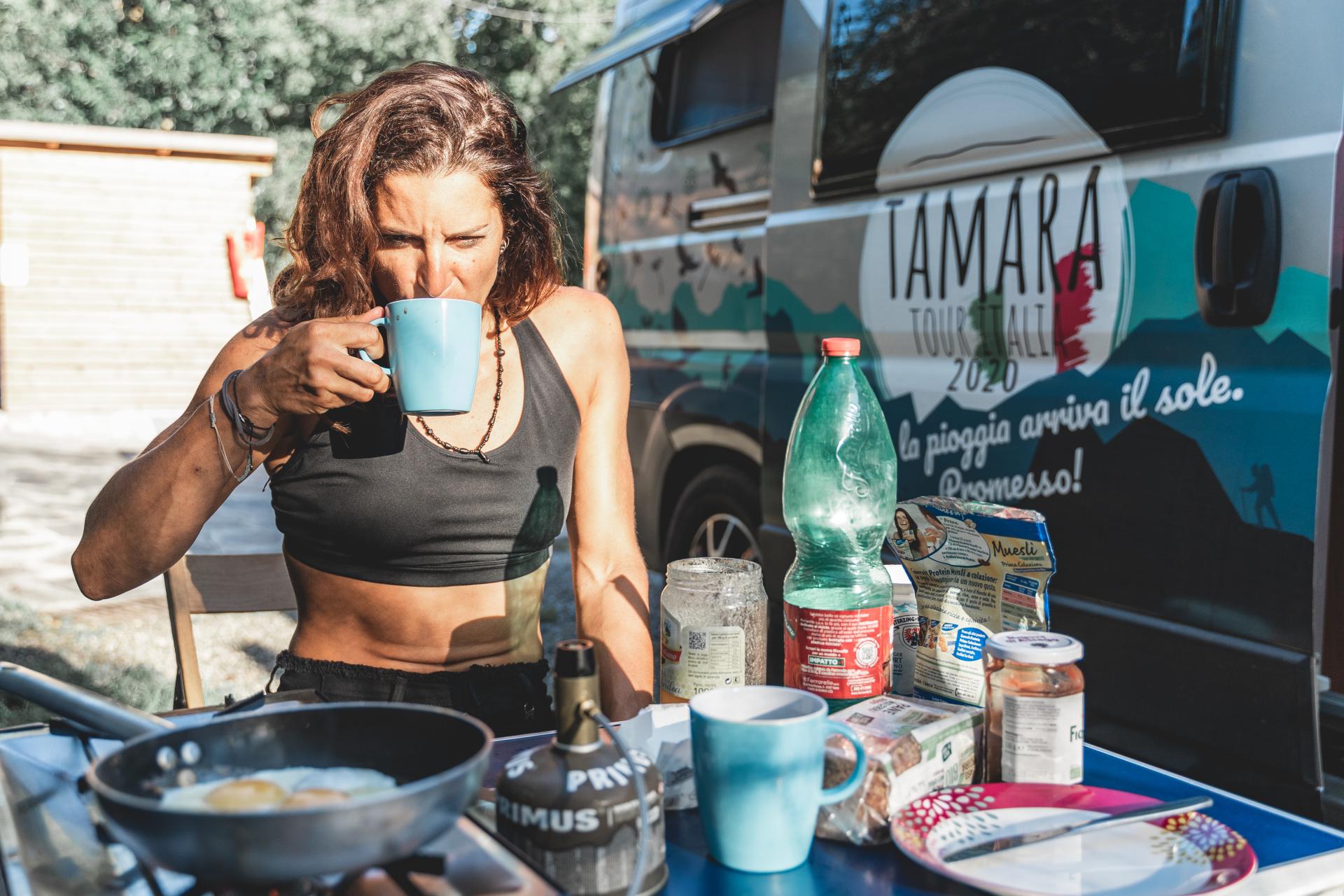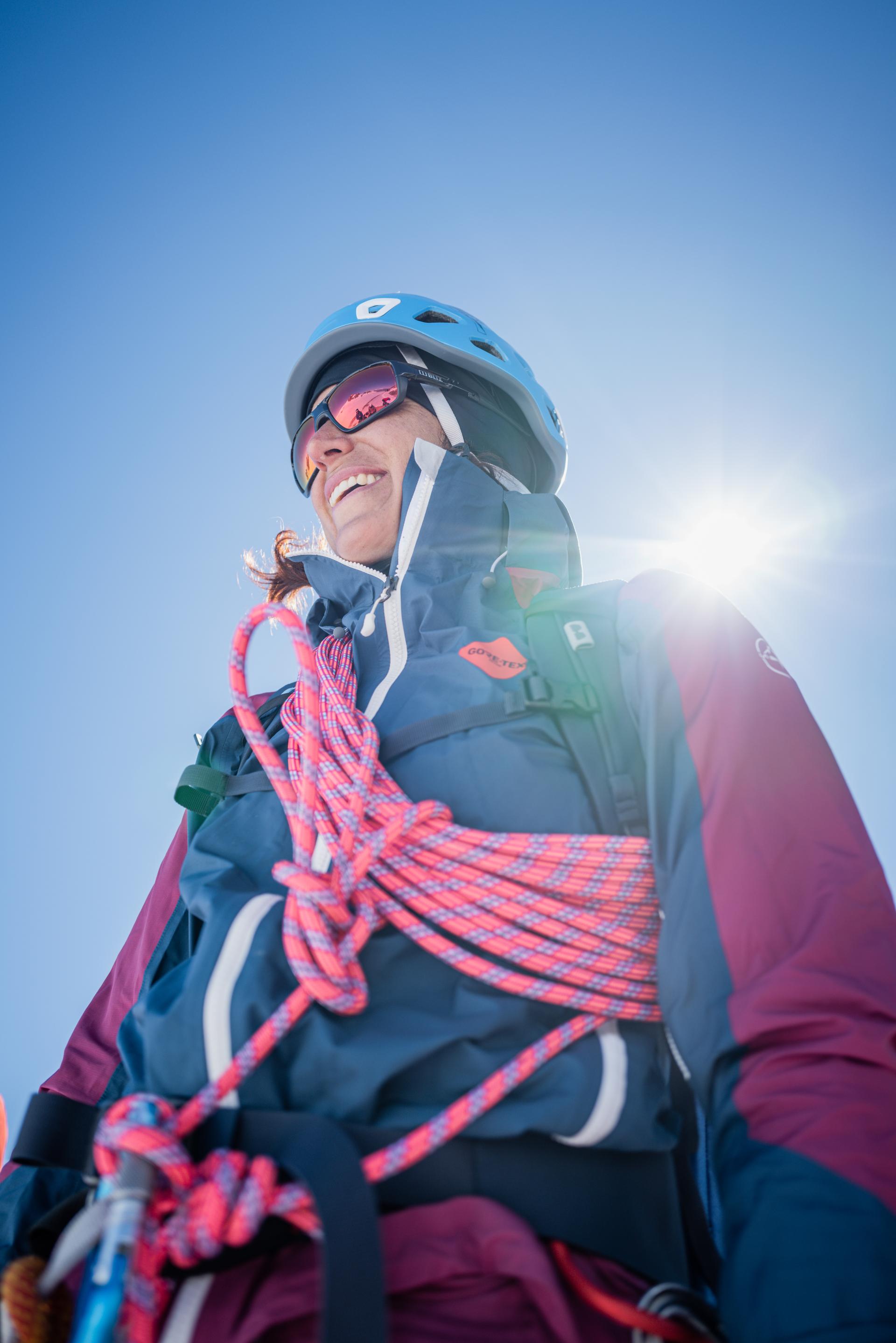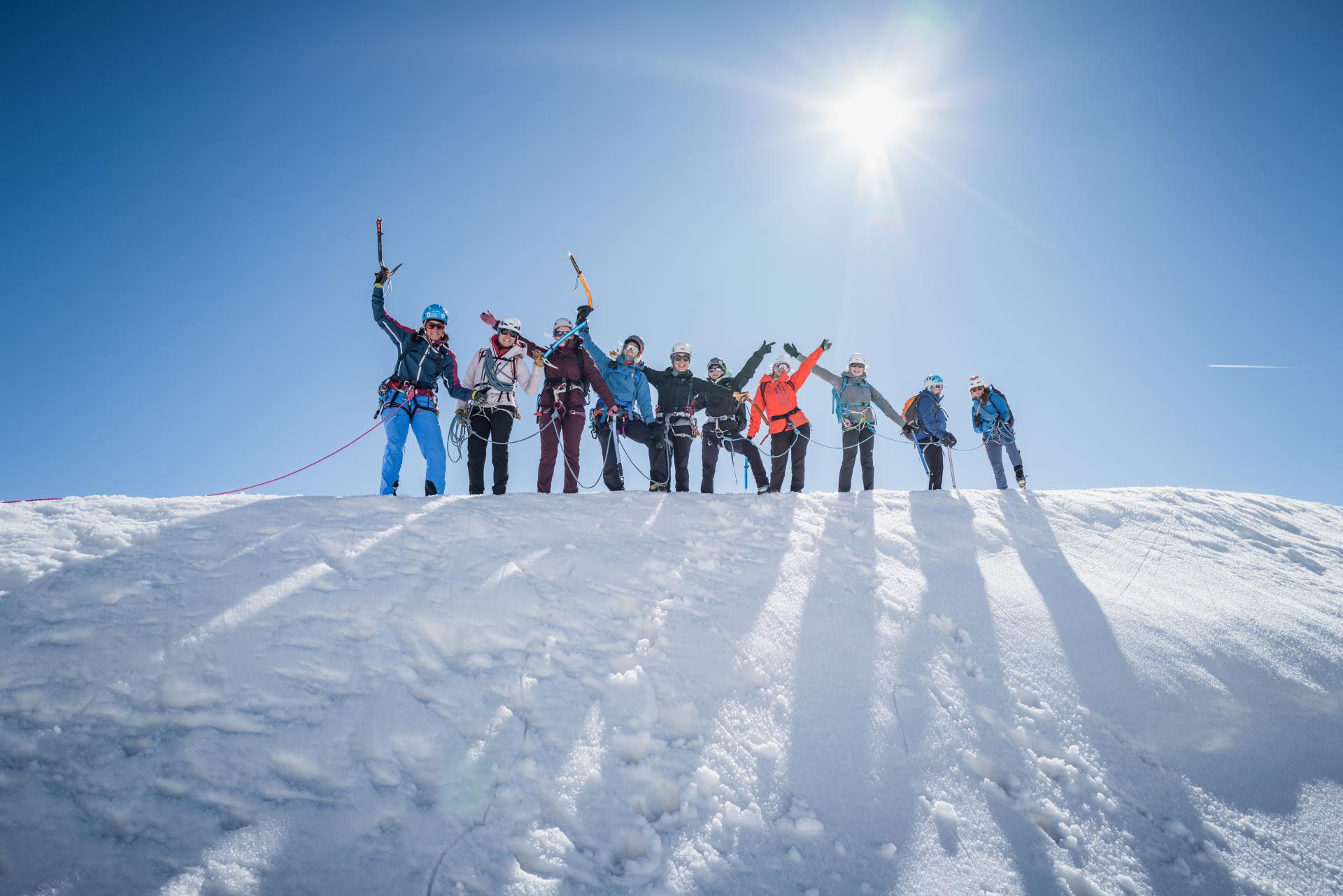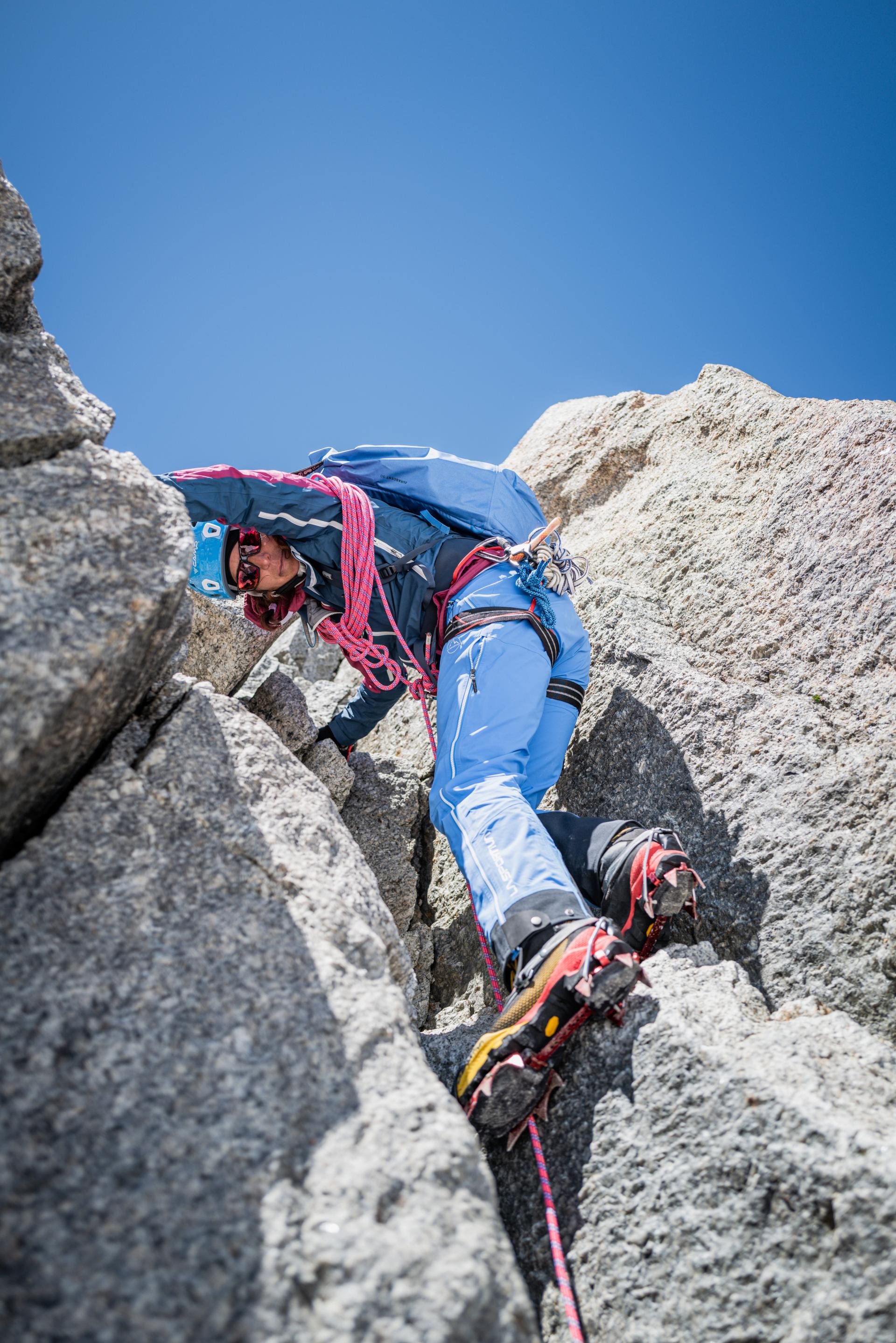PART THREE - LOVE, TRANSFORMATION AND TRUST
Tamara Lunger is a famous Italian mountaineer. She was a national ski mountaineering champion and the youngest woman to summit Lhotse (8,516 meters). In part two of this three-part interview, Tamara opened up about experiencing loss and trauma in the mountains and the impact that has had on her. In this third and final part, Tamara talks about her journey towards love and acceptance of herself following tragedy.

Do you feel more grounded these days, or does the need to make waves still come up?
I feel like I understand myself better, but yes, sometimes I feel the pull to go and destroy myself, but I understand the consequences better now.
Have you ever tried destroying yourself in meditation? Like sitting in meditation for 10 days?
No, not yet, have you?
Me, no I have not yet. I'm too afraid. I think I'm too afraid of sitting still, but I think it would be a great challenge because it's so counter to who I think I am. It’s very easy for me to challenge myself physically, but I'm afraid of challenging myself emotionally. It’s very scary, very vulnerable to be there. I don't know if I'm ready, or able to. Maybe I’m afraid I’d fail.
Yes! It requires a lot of training. I was never afraid of physical challenges, but the mental thing. I always used the excuse “This is the way I am”.
During the Covid lockdown, I was thinking about how to survive that period and I said, “You know, no physical challenge is too big for me, but why do I make excuses for my mental sickness? No, I need to change this.” In that period, I made a big evolution by training my mind more.
Has your definition of success in the mountains changed?
I think so, yeah. If the goal is no longer about proving yourself, but if you do it just because of the love, it opens new possibilities.
Did the experiences change you in any other ways?
After K2, I was also very afraid of dying. I felt it in everything.
That must be hard for someone who is used to finding meaning in dangerous situations.
I had some very hard periods, some deep depression. Life lost some meaning. To that point, I always felt like I could live more like a child, being curious, trying new things. After K2 it felt like somebody stole my life. I saw danger everywhere. I was afraid of riding a bike because you can smash your head on the ground. I was always worried about avalanches. Even walking the street, I thought “My god, these cars are going fast, they could kill me”. It was heavy, I wanted my old life back.
I don't know if it's possible. I'm on my way a little bit, but I'm much more afraid in the mountains. I experienced a fear of exposure for the first time ever. Sometimes I feel like that part of my life is slowly slipping away.
Can you still see beauty in the mountains, or do you just see the danger?
Yes, because I can also say that I love K2. I love K2 even with what it’s taken from me because it’s also shown me things I needed to see. Maybe without it, I would have been already dead. I don't know. You never know.
I had a very strange experience on K2. My heart rate was high, and I was hyperventilating. I lay down and then I saw the goddess of K2. She was a very beautiful woman with curly hair and a very peaceful face. She was above the mountain with a white tunic and this tunic was flowing down until camp two and I was climbing under her skirt. I was alone, but she told me, “You don't need to be afraid because I’ll protect you from wind, from cold, from everything.” But I was always alone. Now, this all makes sense to me because all the people I was in base camp with are no longer with us, but I somehow survived. I have a feeling she is looking out for me.
 Tamara Lunger happy in her element (Photo by Philipp Reiter)
Tamara Lunger happy in her element (Photo by Philipp Reiter)
Would you go back, even just to go to the base camp?
I already went back. The following summer we did a funeral. It was all familiar. I saw where our tent was and the rock where JP would go bouldering. I touched the rock to feel him.
We were a big group, maybe twenty people and we had a memorial. We put up a plaque in their memory. JP’s cousin did a rap and people said goodbye in their own way. His cousin told me that he was grateful that I was the last person with him. It was very beautiful. It made me cry like hell, but it also made me feel lighter. JP and I had developed a special connection and this process was powerful.
How was it to go home?
This time was hard on my boyfriend Davide. I was crying a lot, I could be distant, but I eventually told him everything I was feeling. This was hard on him too because he was in love, and he could feel my pain and loss. But he was there for me, talking with me, holding me. He was there for me when I needed him. He helped me so much through this process. He accepted me and what I was and still am going through. In all this brutality I have found love, acceptance, and beauty.
Life is like that isn’t it? You’ve experienced the full range of life from love to death to loss at a young age. Most people don't experience that until later in life. It is a brutal beauty.
Now I feel that they are up there all the time when I’m having a hard time. I speak to them and ask them questions.
 Tamara celebrating with clinic participants at the Arc’teryx Alpine Academy (Photo by Philipp Reiter)
Tamara celebrating with clinic participants at the Arc’teryx Alpine Academy (Photo by Philipp Reiter)
I'm very happy that you found somebody who's accepting of what you've gone through and supportive. I am also happy that you’re discovering yourself in this process. I believe there is a lot of strength in your new vulnerability, and I really admire that. There is a lot of power in sharing story with people like you do. It gives them permission to examine their own lives. If someone like you, a “hard alpinist” can be open, then maybe they can too.
I love it so much because you touch people’s hearts. I have given some presentations lately, where all the audience was crying, including me. The organizer came up crying and gave me a hug. There is a power in this story. You can inspire a lot of people because even though you have some hard times and can lose yourself, that you can still find a peace, maybe a bigger peace.
Is it hard to be an inspiration? Would you change the outcome if you could have Sergi and JP back?
I think that destiny wanted me to be here now. I'm accepting of it. It has also given me my partner Davide and I could not imagine a more understanding person for me.
It takes a very strong person to take loss and grief and see it as a gift. You are very good at expressing your feelings, so thank you for sharing, I think it's important to have these conversations. The athletic achievements are incredible, but you are now talking and sharing about life. Do you still see yourself as a professional athlete then, or as something else?
Yes, but my problem now is how to be an athlete in this new space, I have been speaking to some older athletes about how they have managed transitions. During the life of an athlete, you're evolving, you're changing. How do you feel in different stages? How are you supposed to feel? I no longer see myself as this higher, faster, machine, I want to be something different, but what is this something different? I still feel afraid about losing my identity, and I need to give space and time to it. I don't know if I will return completely without fear as I was before. I am still learning about myself and who I want to be.
Perhaps you can ask the goddess what you should do? I think you have much more to give.
Yes. I still need to go out of my comfort zone, it’s still a part of me and I need to give space to it. I am even feeling the urge to study again. To help people.
I get the sense that once that spark happens when the energy finds you, you'll make it happen.
I also still really want to be out in the mountains, but then of course I also always want to give my best. Yeah, this is important for me.
Do you think that may be a contradiction, just wanting to be out and giving your best? Do they work against each other?
My way of seeing all this has changed a little bit because before the mountains were more about sports. Now I'm focusing much more on nature. I used to believe that a day without mountains was a lost day. I don’t believe that anymore. Now I crave the whole experience. I used to just want to run, to suffer, to sweat. But now I listen to the birds and everything that surrounds me. It gives me much more. I also train based on my intuition; I don’t follow a plan. I am learning to listen to myself. I am trying to be more intuitive. I used to always be very hard on myself and now I do it with love and I feel much better in my body. I have less pain. My whole being feels better, more complete. I trust myself more.
Are you trying to combine the physical and emotional self in your training?
After K2 I hated the word “training.” Instead, I called it my quality connection time.

Tamara in the alpine (Photo by Philipp Reiter)
Do you feel called back to the mountains again then?
Yes, I won’t go to the big mountains in the winter anymore, but I would like to try to go back, as you said, with my new perspective, trying to go to 8000. I want to feel the difference. At the same time, I don't know if I can keep my energy in all this crowd and mess during peak seasons. But maybe I just really need to prepare well, and try to do something harder, but then you really need a strong partner and partnership. Sometimes, it is nice to be alone, but I want to share the experience and I feel safer with two. I am leaning more towards finding a female partner.
Have you spoken to anyone in particular?
I will be going to South America with Caro North and so far we have a very good connection.
That is great to see if the energy works well between you. Do any of the 7000- or 6000-meter mountains interest you because then you can get away from the crowds a little bit more as well?
For me 8000 meters was always the king discipline
Maybe you need a queen discipline?
Haha, maybe!
Tamara, thank you for your time and openness – shall we go and get another beer?
Yes, definitely!!





